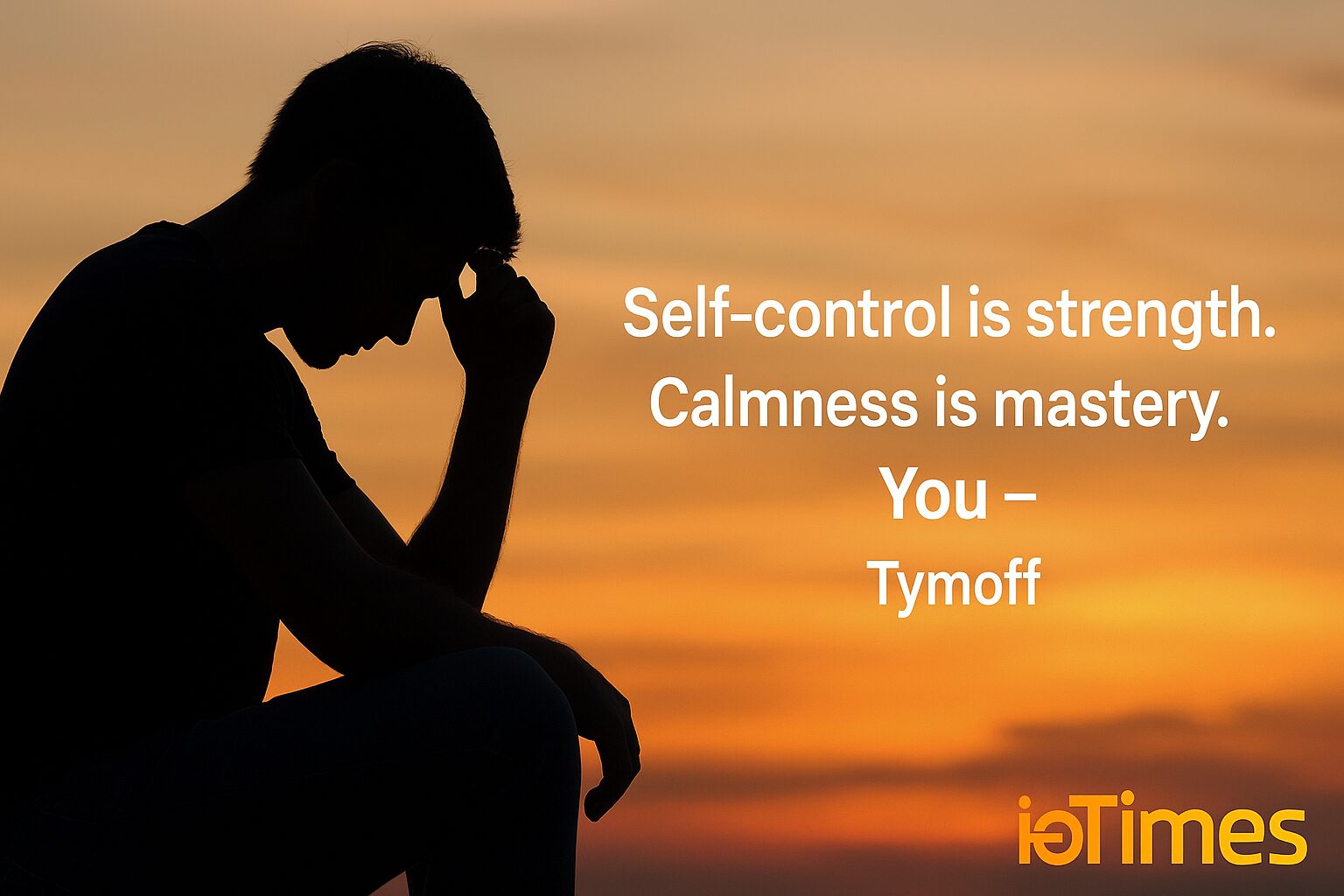In the hustle and bustle of modern life, the ability to maintain composure and exercise self-discipline is often hailed as a key to success. The phrase “Self-control is strength. Calmness is mastery. You – Tymoff” is a profound philosophy that highlights the immense value of inner peace, self-regulation, and personal responsibility. This mantra goes beyond surface-level advice, urging individuals to tap into their deepest reservoirs of strength and mastery to lead fulfilling and purposeful lives.
In this article, we will dive deep into the meaning and application of this statement, exploring the importance of self-control, the role of calmness in our daily lives, and how these qualities work in tandem to enhance our personal and professional growth.
Understanding the Core Philosophy: Strength in Self-Control and Mastery in Calmness
The essence of “Self-control is strength. Calmness is mastery. You – Tymoff” speaks to the power of the human mind and spirit in overcoming challenges and achieving greatness. These concepts are not mere theoretical ideas; they are practical tools that, when applied correctly, can lead to substantial personal growth and improvement. Let’s break down the core components of this philosophy.
Self-Control as Strength
Self-control, also known as self-discipline or willpower, is defined as the ability to regulate one’s thoughts, emotions, and behaviors, particularly in situations where there is an urge to act impulsively or give in to temptation. Far from being a sign of weakness, self-control is a powerful form of strength. It empowers individuals to make decisions based on long-term goals rather than immediate desires, resisting the distractions and impulses that could derail their progress.
The phrase “self-control is strength” underscores the idea that true strength lies not in physical power, but in the ability to maintain focus, resist temptations, and stay committed to a chosen path. Whether it’s sticking to a healthy diet, pursuing personal goals, or overcoming procrastination, self-control plays a pivotal role in achieving long-term success.
Calmness as Mastery
While self-control refers to resisting impulses, calmness is the ability to maintain peace and composure, especially in stressful or challenging situations. It involves emotional regulation, mindfulness, and the capacity to think clearly and make sound decisions even when facing adversity.
“Calmness is mastery” suggests that true mastery in life comes from cultivating inner peace, the ability to stay level-headed, and the resilience to endure difficult circumstances. By fostering calmness, individuals gain a sense of control over their emotions, making them less reactive and more responsive. It is through calmness that people can access their best selves, think critically, and approach problems with a clear and focused mind.
The Significance of “You – Tymoff”
The addition of “You” in the phrase emphasizes the personal responsibility and empowerment that come with these principles. It serves as a reminder that each person has the power to choose their response to life’s challenges. It suggests that mastering oneself is a deeply personal journey, one that requires conscious effort, commitment, and an understanding that change starts within. “Tymoff” could be interpreted as a symbolic representation of one’s journey toward self-mastery, a name that invites the individual to claim ownership over their transformation.
The Power of Self-Control
Self-control is one of the most fundamental traits that individuals can cultivate to succeed in life. It is a mental skill that can be developed over time with practice and dedication.
The Science Behind Self-Control
Psychologists have long studied the concept of self-control, and the findings have profound implications for personal growth. One of the key insights is the concept of “ego depletion,” which refers to the idea that self-control is a finite resource. In other words, the more an individual uses self-control in one area of life (e.g., resisting the urge to eat junk food), the less self-control they have for other tasks later in the day.
However, research also shows that self-control is a skill that can be improved over time. Just like any other muscle, the more you exercise it, the stronger it becomes. Through repeated practice, individuals can increase their capacity for self-regulation, making it easier to stay disciplined and focused in the face of temptation.
Benefits of Self-Control
Practicing self-control offers a myriad of benefits, including:
-
Improved Decision-Making: Self-control allows individuals to make thoughtful, reasoned decisions instead of acting impulsively. This leads to better outcomes, both personally and professionally.
-
Better Relationships: Self-control helps regulate emotional responses, fostering healthier and more positive interactions with others.
-
Increased Productivity: By resisting distractions and staying focused on long-term goals, individuals with self-control are more likely to be productive and achieve success in their endeavors.
-
Enhanced Health: Self-control is linked to healthier lifestyle choices, such as regular exercise, healthy eating habits, and better stress management.
Ways to Improve Self-Control
Self-control can be developed through deliberate practice. Here are some strategies to strengthen this valuable trait:
-
Set Clear Goals: Define your long-term objectives and keep them in mind when making daily decisions.
-
Break Tasks Into Smaller Steps: Instead of focusing on the big picture, break tasks into manageable steps to prevent feeling overwhelmed.
-
Avoid Temptations: If possible, eliminate temptations from your environment. This reduces the need to exercise self-control in the first place.
-
Practice Mindfulness: Being aware of your thoughts and emotions allows you to make intentional decisions, rather than reacting impulsively.
The Role of Calmness in Mastery
Calmness is a cornerstone of emotional intelligence. It plays a crucial role in managing stress, fostering resilience, and making thoughtful decisions.
The Importance of Calmness
Calmness in the face of adversity is what separates effective leaders from those who are easily overwhelmed. Maintaining composure allows individuals to think more clearly, make informed decisions, and act with confidence. Here are some of the benefits of practicing calmness:
-
Clarity of Thought: Calmness promotes mental clarity, enabling you to process information more efficiently and make better decisions.
-
Emotional Balance: By remaining calm, you can avoid reacting emotionally to situations, which often leads to regrettable decisions.
-
Stress Reduction: Calmness reduces the body’s stress response, promoting better health and well-being.
-
Improved Relationships: Staying calm during disagreements helps to resolve conflicts peacefully and fosters healthier relationships.
Techniques for Cultivating Calmness
There are several techniques that can help you cultivate calmness in your daily life:
-
Deep Breathing: Slow, deep breaths activate the body’s relaxation response, helping to calm the nervous system.
-
Meditation: Regular meditation practice can improve emotional regulation and promote a sense of inner peace.
-
Exercise: Physical activity reduces stress and anxiety, contributing to a calmer, more balanced state of mind.
-
Sleep and Rest: Adequate rest is essential for emotional regulation. A well-rested mind is better equipped to handle stress.
-
Positive Visualization: Visualizing positive outcomes can help reduce anxiety and promote a sense of calm before challenging situations.
The Synergy Between Self-Control and Calmness
While self-control and calmness are distinct qualities, they work together to enhance personal mastery. Self-control gives individuals the discipline to stay focused and avoid impulsive actions, while calmness ensures that they can make decisions with a clear, focused mind.
Together, these qualities provide the foundation for emotional intelligence, which is essential for effective leadership, personal growth, and success in all areas of life.
Practical Applications of Self-Control and Calmness
Incorporating these qualities into your life requires intentional effort and consistent practice. Here are some practical applications of self-control and calmness:
-
In the Workplace: Practice self-control by staying focused on your tasks and avoiding distractions. Use calmness to navigate stressful situations and maintain productive relationships with colleagues.
-
In Relationships: Use self-control to regulate emotional responses and calmness to resolve conflicts peacefully. This will foster healthier, more positive interactions with others.
-
In Personal Development: Apply self-control to stay committed to your goals, and use calmness to deal with setbacks and challenges in a measured, thoughtful manner.
Conclusion: The Path to Mastery
The philosophy of “Self-control is strength. Calmness is mastery. You – Tymoff” encourages individuals to take control of their lives by mastering their emotions and behaviors. Through self-control, individuals can resist temptation and stay focused on their long-term goals. Through calmness, they can navigate life’s challenges with grace and clarity.
This philosophy is not about suppressing emotions or denying desires, but about understanding and mastering them. It’s about recognizing that the greatest strength comes from within, and that true mastery is found in cultivating inner peace and self-discipline.
By integrating these principles into our daily lives, we can achieve a state of personal mastery, empowering ourselves to lead more intentional, fulfilling, and successful lives.
Read Also: 5StarsStocks.com Cannabis: Expert Insights for Smart Investors




